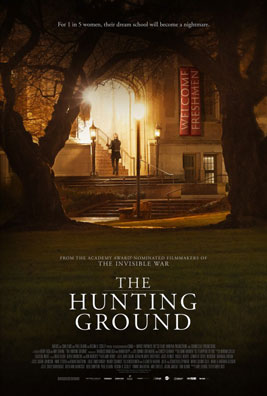April 16, 2015

Amy Ziering ’83
It’s not every day that Amherst students, faculty and staff get to pick the brain of an Academy Award-nominated and two-time Emmy Award-winning documentary filmmaker. But the College community will have the opportunity to do just that on Friday, April 17, when Amy Ziering ’83 returns to Amherst to screen her latest film, The Hunting Ground.
The movie will premiere at Amherst Cinema that day and Ziering will participate in a question-and answer-session immediately following the 7 p.m. showing. The Hunting Ground will then run at Amherst Cinema through Thursday, April 23.
Making this particular film especially relevant is its topic: sexual assault on college campuses.
“The film is another opportunity to for us as a campus to engage with this local and national issue,” said Laurie Frankl, Amherst’s Title IX coordinator, who will see the film for the first time on April 17.

Amherst President Biddy Martin agreed. “Student activists from Amherst and other colleges and universities across the country have given the problem of sexual assault and the requirements of Title IX much-needed attention at the national level,” she said. “They helped spark a national movement, and I hope [Ziering’s] documentary will help spur further change.”
Ziering’s previous film, The Invisible War, a groundbreaking investigation into the epidemic of rape in the U.S. military, won the Audience Award at the 2012 Sundance Film Festival and the 2014 Emmy Awards for Best Documentary and Outstanding Investigative Journalism, Long Form. It was also nominated for a 2013 Oscar. Released by Cinedigm/Documara and broadcast on PBS, The Invisible War led to the federal government’s Military Justice Improvement Act, and was the catalyst for the drafting and passing of 35 additional new Congressional reforms.
In recent years, Amherst has made significant changes in preventing, addressing, and remedying incidents of sexual assault. These changes include overhauling the judicial review process for sexual assault complaints on campus; improving sexual misconduct reporting procedures; hiring Frankl and Amanda Vann, the College’s full-time Sexual Respect Educator; adding more counselors trained in sexual misconduct to the Counseling Center; and conducting bystander training and other sexual misconduct intervention programs for students, faculty and staff.
Amherst will continue to adapt its approach as it learns from students, Frankl added. “They are the ones really driving these changes. It’s so important for them to be heard.”